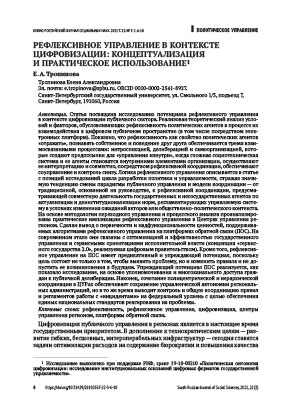Abstract
Following recent theoretical studies and practical implications of digitalization of public sector in Russia this article studies the concept of reflexivity and reflexive governance. We conducted a theoretical analysis of the conditions and factors that determine political agents’ reflexivity. We define ‘reflexivity’, as a property of political agents to ‘mirror, to recognize the behavior and communicative strategies on platforms which are provided by three interrelated processes: introspection, deliberation and self-organization. Reflexivity creates prerequisites for “management from within”, when a complex socio-technical system and its agents become internal elements of the organization, carry out its interpretation and through reflexive coordination, provide co-management and down-top steering and control. The article builds logic of reflexive governance around the concept of governance and the process of policy-making in a broader multi-agent approach and taking into consideration a significant trend of changing the paradigm of public administration and the coordination model. From the traditional, regulative, to reflexive coordination, which provides for cooperative activities of state and non-state agents to adapt and de-institutionalize the norms governing the political system in conditions of changing expectations of actors or socio-political context. Based on the methodology of transitional management and process analysis, we analyze the practical implementation of reflexive governance in Russian Regional Management Centers. We come to the conclusion about the primacy and super functionality of values supported by reflexive algorithms on feedback platforms. At the present stage, these values aim with the optimization and efficiency of public administration and service orientations of the executive branch (the concept of “service state 2.0” implemented by the Russian digital government). In addition, reflexive governance on the feedback platforms has predicative and proactive potential. The key goal is to anticipate and indentify the problem and to change the rules and prevent its occurrence in the future. The proactive potential of the feedback platforms develops, as the study showed, on the basis of full-scale and multi-channel access of citizens to public deliberation. Finally, the combination of polycentric and hierarchical coordination in the Regional Management Centers ensures the preservation of managerial autonomy of regional administrations, but at the same time brings control and overall coordination of rules and regulations for dealing with “incidents” to the federal level, in order to ensure uniform national standards for responding to problems.
Keywords
Funding information
The research was carried out through the financial support of the Russian Scienсе Foundation, grant No 19–18–00210 “Political ontology of digitalization: Study of institutional bases for digital forms of governability”.
References
Алексеева, Т.А. (2001). Справедливость как политическая концепция: Очерк современных западных дискуссий. М.: Московский общественный научный фонд.
Большакова, Ю.М. (2021) Вопросы цифровизации в контексте современного этапа эволюции публичного управления. Власть, 4, 43–48.
Канарш, Г.Ю. (2011). Социальная справедливость: философские концепции и российская ситуация. М.: Издательство Московского гуманитарного университета.
Лефевр, В.А. (1967) Конфликтующие структуры. М.: Высшая школа.
Постановления Правительства Российской Федерации от 16 ноября 2020 года, № 1829, 1830. Режим доступа http://government.ru/news/40861/
Ролз, Дж. (2010). Теория справедливости. М.: ЛКИ.
Ситуационные центры развития как интеграторы государственного управления в саморазвивающихся полисубъектных средах (2019). М.: Когито-центр.
Сморгунов, Л.В. (2017). Государство, сотрудничество и инклюзивный экономический рост, Власть, 11, 22–30.
Сморгунов, Л.В. (2020). Институты доступности цифровых платформ и государственная управляемость. Южно-российский журнал социальных наук, 3, 6–19. DOI: 10.31429/26190567-21-3-6-19
Усов, В.Н. (2008). Рефлексивное управление: философско-методологический аспект (Автореферат докторской диссертации). Екатеринбург.
Центр управления регионом Губернатора Московской области. Режим доступа http://d-russia.ru/wp-content/uploads/2019/09/rymar.pdf
Швери, Р. (1996). Теоретическая социология Джеймса Коулмена: аналитический обзор. Социологический журнал, 1–2, 62–81.
Щедровицкий, Г.П. (1967). О методе семиотического исследования знаковых систем. Семиотика и восточные языки. М.: Наука.
Boltanski, L., Thevenot, L. (1999). The Sociology of Critical Capacity. European Journal of Social Theory, 3, 359–377.
Сhilvers J. (2013). Reflexive Engagement? Actors, Learning, and Reflexivity in Public Dialog on Science and Technology. Science Communication, 35(3), 283–310. DOI: 10.1177/1075547012454598
Dryzek, J.S. (1990). Discursive Democracy: Politics, Policy, and Political Science. Cambridge: Cambridge University Press.
Dryzek, John S., Berejikian, J. (1993). Reconstructive Democratic Theory. American Political Science Review, 87(1), 48–60.
Dryzek, J.S. (2013). The deliberative democrat’s Idea of Justice. European Journal of Political Theory, 12(4), 329–346. DOI: 10.1177/1474885112466784
Feindt, P., Weiland, S. (2018). Reflexive Governance: Exploring the Concept and Assessing its Critical Potential for Sustainable Development. Introduction to the Special Issue. Journal of Environmental Policy & Planning, 20(6), 661–674, DOI: 10.1080/1523908X.2018.1532562
Gulledge, T., Sommer, R. (2002). Business Process Management: Public Sector Implications. Business Process Management Journal, 8, 364–376. DOI: 10.1108/14637150210435017
Hofmann, J., Katzenbach, C., Gollatz, K. (2017). Between Coordination and Regulation: Finding the Governance in Internet Governance. New Media & Society, 19(9), 1406–1423. DOI: 10.1177/1461444816639975
Kemp, R., Loorbach, D. (2006). Transition Management: A Reflexive Governance Approach. In J. Voss, D. Bauknecht & R. Kemp. (Eds) Reflexive Governance for Sustainable Development. Cheltenham, Edward Elgar.
Latour, B. (2010). A Collective of Humans and Nonhumans. In Technology and Values: Essential Readings. Willey-Blackwell.
Lawless, J.S. (2010). Reflexive Governance: Redefining the Public Interest in a Pluralistic World. Hart Publishing.
Smith, A., Stirling, A. (2007). Moving Outside or Inside? Objectification and Reflexivity in the Governance of Socio-Technical Systems. Journal of Environmental Policy&Planning, 9(3–4), 351–373, DOI: 10.1080/15239080701622873
Smith, A., Stirling, A. & Berkhout, F. (2005). The Governance of Sustainable Socio-Technical Transitions. Research Policy, 1491–1510. DOI: 10.1016/j.respol.2005.07.005
Smith, A., Stirling, A. (2008). Social–Ecological Resilience and Socio-Technical Transitions: Critical Issues for Sustainability Governance. Brighton: STEPS Centre.
Torgerson, D. (2007). Policy Discourse as Dialogue: Emergent Publics and the Reflexive Turn. Critical Policy Studies, 1, 1–17, DOI: 10.1080/19460171.2007.9518506
Tropinova, E. (2020). Institutionalization of Digital Public Administration Design: The Reflexive Potential of Agents of Change. Journal of Economic Regulation, 11, 78–86.


